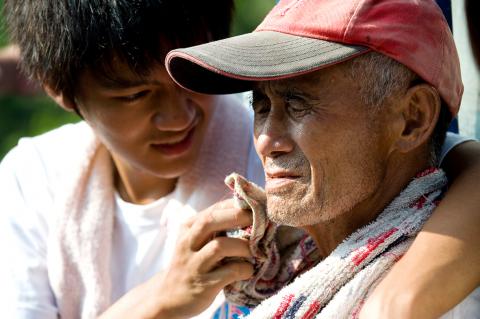For her debut feature Finding Sayun (不一樣的月光), Atayal director Chen Chieh-yao (陳潔瑤) returns to her home village to unearth the legend of Sayun (sometimes spelled Sayion), an Atayal girl who fell to her death in a turbulent stream while carrying a Japanese teacher’s belongings at the end of World War II.
Whereas Wei Te-sheng’s (魏德聖) big-budgeted Seediq Bale (賽德克.巴萊) tackled Aboriginal history in the form of battle epic, Chen (or Laha Mebow in Atayal) takes a completely different approach, examining her Aboriginal roots through personal memories and scenes from everyday life.
The movie begins when the tale of Sayun draws a television crew to the Atayal hamlet of Tyohemg (金岳) in Nanao Township (南澳), Yilan County. Yukan (Tsao Shih-hui, 曹世輝), a high-school boy and a young hunter, does not understand the crew members’ interest in the story. But his grandfather’s (Chang Chin-chen, 張金振) memories of Sayun, whom he went to school with, revives his interest in the old tribal village, which the villagers had been forced to desert 50 years prior.

Photo courtesy of Sky Films Entertainment
The grandfather wants to pay a visit to his childhood home, and Yukan is determined to fulfill the old man’s wish. One day at dawn, together with Yukan’s friend A-guo (Cheng Chia-yeh, 鄭嘉業) and Hsiao-ju (Fang Chih-yu, 方志友) from the crew, they embark on a journey along the treacherous trail to the Atayal home.
Shot entirely in and around the Atayal village and with a cast of mostly nonprofessional, Aboriginal actors, the film is director Chen’s sincere attempt to reconnect with her roots. She delivers a refreshing, lively portrait of Aborigines, who are often depicted as miserable and depressed in films such as Everlasting Moments (靈魂的旅程). Lin Ching-tai (林慶台), who plays Mouna Rudo in Seediq Bale, returns in this movie to his real-life profession (he’s a pastor) and the young Atayal actors give confident performances.
To be honest, Finding Sayun is a debut effort with many flaws. Its storytelling is uneven, and the decision to insert two irrelevant Chinese characters — in order to woo Chinese investors perhaps? — is awkward. Moreover, the film can be fairly confusing to audience members unfamiliar with the legend of Sayun.

Photo courtesy of Sky Films Entertainment
The significance of the story surfaces only if one knows how Japanese colonialists used it for propaganda purposes, the fact that director Chen’s grandmother was Sayun’s classmate and friend, and how the late banker Lin Keh-hsiao (林克孝) kindled public interest in the village when he wrote a book in 2009 about his years investigating the story of Sayun.
Still, Chen knows that there is more than one way to look at history, and uses documentary footage to show how differently the story is remembered by the villagers she interviews. In the end, Finding Sayun is the director’s journey of finding her own way home as she follows the 77-year-old tribal elder Chang to the place where her grandparents were born and the ancestral spirits still dwell.

Photo courtesy of Sky Films Entertainment

This is the year that the demographic crisis will begin to impact people’s lives. This will create pressures on treatment and hiring of foreigners. Regardless of whatever technological breakthroughs happen, the real value will come from digesting and productively applying existing technologies in new and creative ways. INTRODUCING BASIC SERVICES BREAKDOWNS At some point soon, we will begin to witness a breakdown in basic services. Initially, it will be limited and sporadic, but the frequency and newsworthiness of the incidents will only continue to accelerate dramatically in the coming years. Here in central Taiwan, many basic services are severely understaffed, and

Jan. 5 to Jan. 11 Of the more than 3,000km of sugar railway that once criss-crossed central and southern Taiwan, just 16.1km remain in operation today. By the time Dafydd Fell began photographing the network in earnest in 1994, it was already well past its heyday. The system had been significantly cut back, leaving behind abandoned stations, rusting rolling stock and crumbling facilities. This reduction continued during the five years of his documentation, adding urgency to his task. As passenger services had already ceased by then, Fell had to wait for the sugarcane harvest season each year, which typically ran from

It is a soulful folk song, filled with feeling and history: A love-stricken young man tells God about his hopes and dreams of happiness. Generations of Uighurs, the Turkic ethnic minority in China’s Xinjiang region, have played it at parties and weddings. But today, if they download it, play it or share it online, they risk ending up in prison. Besh pede, a popular Uighur folk ballad, is among dozens of Uighur-language songs that have been deemed “problematic” by Xinjiang authorities, according to a recording of a meeting held by police and other local officials in the historic city of Kashgar in

It’s a good thing that 2025 is over. Yes, I fully expect we will look back on the year with nostalgia, once we have experienced this year and 2027. Traditionally at New Years much discourse is devoted to discussing what happened the previous year. Let’s have a look at what didn’t happen. Many bad things did not happen. The People’s Republic of China (PRC) did not attack Taiwan. We didn’t have a massive, destructive earthquake or drought. We didn’t have a major human pandemic. No widespread unemployment or other destructive social events. Nothing serious was done about Taiwan’s swelling birth rate catastrophe.